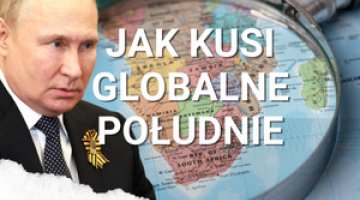The countries of Central and South-Eastern Europe on the crisis in Ukraine
Although Poland’s Central and South-Eastern European partners from the EU evaluate the recent developments in Ukraine in a very similar manner, their reactions have been quite different. This is the result of a number of domestic factors, such as the condition of relations with Russia and their energy dependence on it, experiences with relations with Ukraine and the role of national minorities. Against the background of the region, actions taken by the Visegrad Group have played a consolidating role and mobilised its members to more decided reactions, supporting the pro-European ambitions present among the Ukrainian people. In turn, the perception of the policy of the new Ukrainian government, especially as seen in Hungary, Romania and Bulgaria, has been adversely affected by the actions taken by the Ukrainian parliament and the far right, which have been interpreted as a challenge to the status of national minorities. Most likely the actions of the countries of this region would have been more concerted had there been more unity between their key partners from the European Union and the United States.
The region’s countries on the developments on the Maidan and the change in government in Ukraine
The members of the Visegrad Group supported Ukraine, more or less actively, in the process of preparations to sign the Association Agreement ahead of the Vilnius Eastern Partnership last November. Joint diplomatic actions also continued during the turbulent protests in Ukraine. Each time the regime in Kyiv took a harder stance, this was condemned by the prime ministers or the ministers of foreign affairs from the V4, who in their joint statements reiterated their support for a democratic Ukraine. The ministries of foreign affairs started co-operating more closely, in case any negative events occurred on the border with Ukraine, launched joint monitoring and embarked upon the preparation of scenarios of action and co-operation. All the V4 countries have also taken measures to provide humanitarian aid, for example, by accepting those injured in the clashes in Kyiv at hospitals.
Among the V4 members evaluations of the situation in Ukraine were very similar. In the V4’s joint statements, responsibility for the escalation of the conflict was placed upon President Yanukovych’s leadership. Diplomatic actions taken by the Czech Republic carried similar overtones. In the case of Slovakia and Hungary, which are heavily dependent on oil and gas supplies from Russia, the V4’s statements were harsher than the stances officially adopted by these states domestically. Statements issued by governments in Bratislava and Budapest were more moderate in formulating their evaluation, especially regarding the role played by Russia as being co-responsible for the crisis. However, differences in the views, especially those concerning inviting Russia to talks on Ukraine, did not affect the coherency of the main message from the V4, which resounded as a constructive expression of the region’s care for stability in Ukraine. In the EU, Poland’s partners from the V4 had from the very beginning emphasised the significance of the V4’s joint approach. The diplomatic efforts of the individual countries, however, were affected by the special conditions present in each of them and would often disrupt the unity of the common message.
The Hungarian government, which is presiding over the Visegrad Group, has been very moderate in its public evaluation of the role played by Russia in the developments in Ukraine. Before the conflict in Ukraine escalated, Hungary established closer co-operation with Russia by signing an agreement on 14 January according to which Russians would build new nuclear reactors at the Paks power plant. Hungary participates in the South Stream gas pipeline construction project, and is set to embark upon negotiating a new gas contract soon (the one presently in force expires in 2015). In the Hungarian election campaign ahead of the parliamentary election scheduled for 6 April, the left-wing opposition, which had criticised the government’s pro-Russian moves, also started criticising the government for the lack of firm reaction and the lack of support for the Ukrainian opposition when the first victims of the clashes in Kyiv appeared. While condemning acts of violence in Ukraine, Hungary’s ministry of foreign affairs was attempting to maintain a neutral stance, appealing for moderation from both sides of the conflict. Hungary’s diplomacy from the very beginning had been concerned above all with the way the crisis would affect the situation of the Hungarian minority in Ukrainian Zakarpattia region (around 150,000 people). The government in Budapest emphasised it was concerned about the way the situation had developed and about the threat of extremism. It voiced its protest especially clearly following an incident in Berehove in Zakarpattia Oblast, where members of the Right Sector disrupted the session of the city council on 24 February.
Romania has reacted passively to the developments on Kyiv’s Maidan in comparison to the common stance adopted by the V4. This was due to its obvious surprise at the speed with which the situation developed. Bucharest’s traditional passiveness in relations with Kyiv and the fact that its policy in the Eastern Partnership area had been focused almost exclusively on Moldova. Like Hungary, Romania repeatedly officially expressed its serious concern with the way its compatriots were protected in Ukraine (around 150,000 Romanians and around 250,000 Moldovans, for whom Bucharest also feels responsible). Even Croatia’s ministry of foreign affairs was more active, clearly backing the demonstrators. The Croatian minister of foreign affairs, Vesna Pusic, met with demonstrators on the Maidan in Kyiv.
The policy adopted by Hungary, Romania and Bulgaria towards Ukraine since power was taken by the former opposition in Kyiv has been strongly affected by the fact that the Ukrainian parliament repealed the Language Act, which had ensured the Russian language and the languages of other national minorities a stronger position in Ukraine. Hungary strongly protested against this, and was followed by Romania and Bulgaria, anxious of the situation of 200,000 ethnic Bulgarians in Ukraine.
The countries’ reactions to the Russian intervention in Crimea
The Czech Republic (in addition to the Baltic states) reacted most strongly among Poland’s partners in the region to Russian moves in Crimea. The Czech minister of foreign affairs summoned the Russian ambassador in Prague. The minister of defence, Martin Stropnicky, and the minister for the legislation and human rights, Jiri Dienstbier, stated independently of each other that they could not imagine a Russian consortium winning the tender for the construction of new nuclear reactors at Temelin nuclear power plant. Later Prime Minister Bohuslav Sobotka warned against “burning bridges” in Czech-Russian economic relations, and cut off these speculations, emphasising that it was not up to the government but the state-controlled CEZ company to make the decision (most probably, no one will win the tender anyway). Nevertheless the stance adopted by the Czech Republic was one of the toughest in the EU, and at the same time relatively coherent. The Czech government, ministry of foreign affairs and civil society all clearly expressed criticism towards Russia with their actions. The Czech Republic backed withholding the action aimed at introducing a visa-free regime between the EU and Russia. The clarity of the Czech stance was emphasised by the fact that it was formulated by the Social Democrats, who traditionally opt for dialogue with Russia to be strengthened.
Slovenia adopted a different stance on the Russian aggression, emphasising its good relations with Russia. The Slovenian minister of foreign affairs suggested he could play the role of mediator in EU-Russia talks and publicly opposed the imposition of sanctions. Slovakia also took a moderate standpoint. Although Prime Minister Fico stated that Russia had violated international law and the minister for foreign and European affairs said that the EU could not accept fait accompli methods, Slovakia took a different line to its partners from the V4 – its diplomacy did not initially react to the Russian military actions in Crimea, and then opposed the imposition of sanctions. Hungary also adopted an ambiguous stance. The Hungarian minister of foreign affairs condemned the Russian intervention, backed the sovereignty and integrity of Ukraine and emphasised support for the Association Agreement with Ukraine to be signed as soon as possible. Prime Minister Orban, who expressed his opinion as late as 3 March, did, however, emphasise the neutrality of Hungary’s stance on the Ukrainian-Russian conflict. He also announced that Hungary would appeal for the launch of negotiations between the EU and Russia. While expressing his support for a democratic Ukraine, he confirmed that the security of Zakarpattian Hungarians was the most important issue for Hungary. The excuse that the government’s moderate reaction was grounded in concerns for Hungarian minorities allows Fidesz to neutralise the opposition’s accusations of it being submissive to Russia. Romania has also emphasised the significance of protecting minority rights in Ukraine. However, its stance is inconsistent. President Basescu stated that the Russian moves in Crimea were in violation of international law and equated to “open aggression”, and at the same time emphasised that this conflict could pose a direct threat to the interests of Romania only in the longer term. The government lead by Victor Ponta, which needed to deal with the coalition crisis, has been relatively passive regarding the Ukrainian issue.
Conclusions
As regards the possible further development of the processes in Ukraine and the role Russia will play, the countries in this region share similar views – more than ever before – especially those from the Visegrad Group. However, certain differences between them are fundamental—these include: conclusions concerning the appropriate response to make to the Russian moves, the need for Western pressure on Russia and its scope, the problem of taking Russia into account in the resolution of Ukrainian problems. When Russia launched its actions in Crimea, the fundamental issues of respecting a country’s sovereignty and the inviolability of state borders have been emphasised in different ways both as part of diplomatic efforts and in public discourse. It would even be possible to get the impression that, in comparison to the Kosovo crisis in 1999 and the Georgian war in 2008, aspects of international law are no longer given top priority in domestic discussions and influencing the positions of the countries in this region. They expect their key partners from the European Union and the United States to adopt a more uniform stance on such issues. In turn, by themselves – despite the commonly shared concerns – they would rather emphasise their individual interests and approach the most essential issues in the international order from a narrower angle of defending their national interests (e.g. protecting the rights of their compatriots).
Although the act cancelling the status of regional languages has not been signed by the acting president, Oleksandr Turchynov, a group of countries emphasising their concern about a possible backwards step in the area of respecting the rights of ethnic minorities in Ukraine has formed in the EU; and this, in parallel, has been strongly exploited by Russian propaganda. These concerns, clearly voiced also by German diplomacy, were reflected in the joint stance formulated by the Council of the European Union on 3 March.
Co-operation: Jakub Groszkowski, Tomasz Dąborowski, Andrzej Sadecki, Marta Szpala





